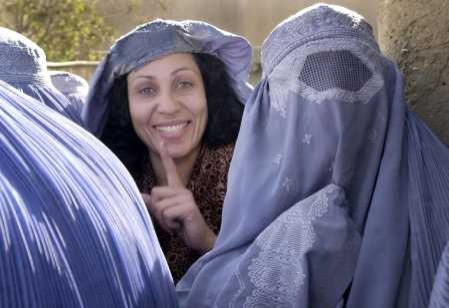Afghan Women Fear Erosion of Rights Once NATO Troops Depart

The president of Afghanistan Hamid Karzai has offered clemency to a rape victim (who was subsequently imprisoned for adultery) after she agreed to marry the man who assaulted her.
The young woman in question, identified as Gulnaz, gave birth to a baby girl behind prison walls during her incarceration.
The news was issued through a statement from the presidential palace in a case that has attracted international attention and outrage.
As… both sides [Gulnaz and the rapist] have agreed to get married to each other with conditions, respective authorities were tasked to take action upon it according to Islamic Shariah [law], the statement said.
The president ordered the office of administrative affairs and the secretariat of the council of ministers to make the decree of Gulnaz's release.
Kimberley Motley, Gulnaz’s American lawyer, told BBC: In my conversations with Gulnaz she told me that if she had the free choice she would not marry the man who raped her.”
Nonetheless, Vygaudas Usackas, the European Union’s (EU) Ambassador and Special Representative to Afghanistan, hailed Gulnaz’ release.
Her case has served to highlight the plight of Afghan women, who 10 years after the overthrow of the Taliban regime often continue to suffer in unimaginable conditions, deprived of even the most basic human rights, he said.
While we applaud the release of Gulnaz, on the orders of President Karzai, it is the hope of the European Union that the same mercy that has been extended to Gulnaz is applied to all women in similar circumstances.
It is believed that hundreds, perhaps thousands, of women in Afghanistan are languishing in jails over so-called ‘moral crimes’ -- but who, in reality, were victims of rape, torture and other acts of domestic violence.
Still, a decade after the Taliban were overthrown, women have made some progress in Afghanistan.
Indeed, according to reports, almost one-third of Afghan MPs are women, while 2.5 million girls in the country now attend school.
Now, human rights activists are gravely concerned that once Western troops depart Afghanistan and the Kabul government is forced to make a peace deal with Taliban officials, the rights that Afghan women have gained over the past decade will erode.
Fawzia Koofi, a female member of the parliament in Kabul, lives in apprehension of the Taliban (and other militant groups), who once already tried to kill her.
It was the Taliban. They kept shooting at my car for half an hour, she told BBC. But luckily I survived that. For me the threats are [increasing], because I don't like to keep silent. Our intelligence service wrote to me saying please strengthen your security measures and be careful. I don't know what that means. How can I be careful if they want to assassinate me?
Now, she fears that what modest progress Afghan women have gained in the past ten years will vanish if and when the Kabul government makes concessionary deals with the Taliban.
They [NATO and Western nations] seem to kind of turn their face to the women's issues, and say we just want to say goodbye and leave Afghanistan, and that could put us even more at risk because we have been outspoken about what we want,” she told BBC.
If they leave without giving us an assurance for our own security, the women's rights activists will be the first victims.”
Another prominent women’s rights proponent, Wazhma Frogh, of the Afghan Women's Network, lamented to BBC: There are times when we laugh among women's groups and say 'Okay, the first day you might be hanging around this square or you might be killed’. We joke about it on a daily basis, because we are that scared.”
She added: The nightmare that I have is the memories of when I lived under the Taliban. That's what we went through and that's what might come back.
Similarly, Fakhia, a widowed Afghan woman living in New York, told Women's eNews “When the Taliban were in power, women were badly treated. But now women have been gaining a little bit more freedom. If they come back, the Taliban will never tolerate women's freedom.”
The statistics for Afghan women remain grim. According to the Integrated Regional Information Networks (IRIN) news agency, 87 percent of girls in the country are illiterate; only 30 percent even have access to education; one out of three women have endured physical, psychological or sexual violence; at least 70 percent are pressured into forced marriages; and the average woman only has a life expectancy of 44 years.
© Copyright IBTimes 2025. All rights reserved.





















